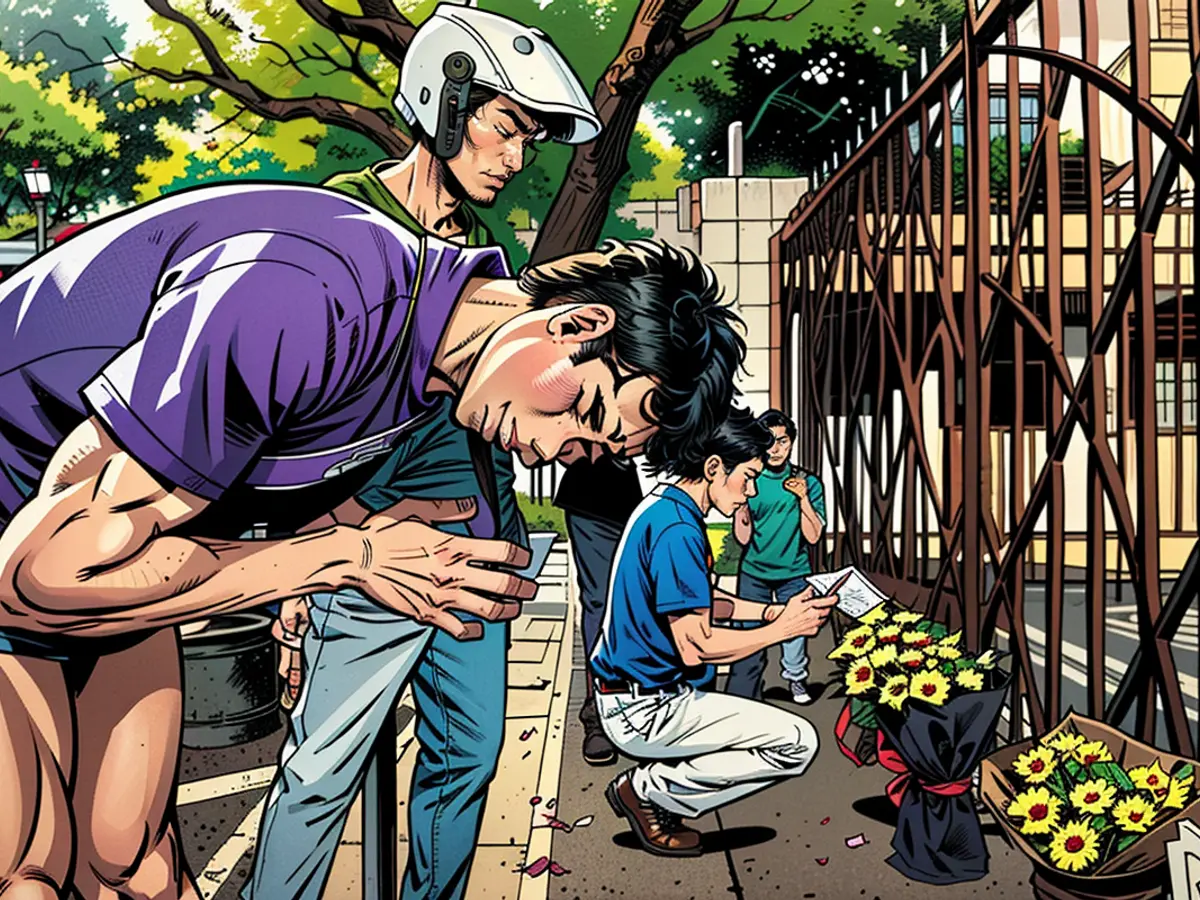'Examination of Hatred-Fueled Actions': Japanese Boy's Slaying Causes Reflection on Growing Nationalism in China
The sad demise of a young soul has once more brought into focus the intricate connection between the two largest economic powers in Asia, which has been molded by their war-torn past and the shifting power dynamics resulting from China's ascendancy.
The 10-year-old, the offspring of a Japanese father and a Chinese mother, lost his life due to a stabbing incident in the southern city of Shenzhen on a Wednesday. This incident marked the second knife attack on Japanese children and the third assault on foreigners in China in recent months.
Chinese authorities have remained silent on the motives behind each occurrence, labeling them as "isolated incidents" that could occur in any part of the world.
However, some Shenzhen residents and online commentators have viewed the daylight killing in one of China's most cosmopolitan cities as a cause for urgent introspection concerning the role of nationalistic propaganda and xenophobia in instigating such acts.
A Shenzhen inhabitant expressed their sentiments by laying a white rose by the Japanese school following the boy's death. They stated, "As a Chinese, I feel heartbroken, outraged, and ashamed. This kind of violence springs from the long-term nurturing of hatred [...] There's no goodness in instilling hatred from a young age."
The sentiment echoed the wave of criticisms and online posts that emerged, many of which have since been erased by Chinese social media platforms.
A Chinese blogger, in a now-deleted viral article on WeChat, suggested, "The 'anti-Japan rhetoric' based on nationalist narratives has grown to dominate the internet. These online remarks will inevitably spill over into the 'real world.'"
The incident has left the Japanese community in China shaken, prompting some of Japan's biggest companies to contemplate the repatriation of their staff members and families. This could potentially undermine Beijing's recent attempts to woo Japanese businesses to invest in China, amidst a mass exodus of foreign capital from China's ailing economy.
Old Wounds
Japan has been a long-standing target of Chinese nationalist resentment, stemming from its brutal invasion and occupation during World War II. Generations of Chinese have been educated about the atrocities committed by Japanese soldiers through school textbooks and state television.
This resentment is further fueled by territorial disputes in the East China Sea and geopolitical tensions, as China simmers with anger over what it perceives as Japan's deepening alliance with the United States to thwart its rise.
China has intensified its "patriotic education" under Xi Jinping, who frequently invokes China's "century of humiliation" to rally public support for his nationalistic agenda to assert Chinese power on the global stage.
The stabbing incident coincided with the anniversary of Japan's invasion of northeast China, a day commemorated with sirens and moments of silence across the country.
The sensitive timing has fueled speculation that the attack was motivated by hatred.
A rare statement issued last week by dozens of Chinese living in Japan condemned the assault and urged reflection on the "underlying causes."
Signed by intellectuals, professionals, businesspeople, and students with their real names, the statement delivered a sharp critique of Beijing's policies and pledged to rectify the "disturbing situation."
Beijing has denied the accusations.
"There is no so-called Japan-hating education in China," Foreign Ministry spokesperson Lin Jian said Monday.
"We advocate learning from history, not to perpetuate hatred, but to prevent the tragedy of war from happening again."
Nationalistic Clickbait
The Chinese Communist Party has long cultivated nationalism to bolster its legitimacy.
Under Xi, China's heavily censored social media has witnessed a surge of ultra-nationalistic, anti-Japan rhetoric. In some instances, the anger appears to have been fanned by the Chinese government and state media to pressure Tokyo, such as the "coordinated outrage" last year over Japan's release of treated wastewater from the Fukushima nuclear plant.
In other instances, nationalism is employed as clickbait by online influencers who often peddle jingoistic rhetoric and conspiracy theories to attract traffic. A Chinese man recently went viral after posting a video of himself defacing the Yasukuni Shrine in Tokyo, a controversial symbol of Japan's military legacy that honors the country's war dead, including some convicted of war crimes.
Some of this online hatred has spilled over to Japanese schools in China's largest cities with a significant Japanese business and worker presence. Since last year, hundreds of videos inciting hostility and suspicion of these facilities have surfaced on Chinese video-streaming sites. Many called for the schools to be closed, and some even accused them of training Japanese spies.
"Conspiracies against Japanese schools have evolved into a shortcut for viral content," a blogger wrote on WeChat last week, after analyzing nearly 300 clips on videoplatform Kuaishou, which he claimed drew over 2 million upvotes.
Following the article, Kuaishou suspended more than 90 accounts that spread hostility between China and Japan, according to a statement released Saturday.
Concerns have been raised about the influence of growing online xenophobia on Chinese children.
Zhang, a teaching assistant at a private school in Shanghai, said she has noticed children as young as six portraying Japanese as villains.
"Kids in the first grade often use derogatory terms towards Japanese individuals when they come across Japanese flags in their storybooks. Moreover, they draw illustrations of conflicts, with the adversaries always being either Japanese or American. This isn't something that we teach at school," a woman shared with CNN. "I suspect that the children have picked up this anti-Japan sentiment from TV shows, viral videos on the internet, or possibly their families."
'Completely inappropriate'
On Monday, Japan's Foreign Minister Takashi Haneda demanded China to take action against discriminatory online posts against Japan and ensure the security of Japanese citizens during a meeting with China's top diplomat Yang Jiechi in New York.
Haneda stated, "Baseless, misleading, and anti-Japanese social media content, especially those targeting Japanese schools, is harmful to the security of children and is completely inappropriate," quoted AP, referring to a press release from Japan's Foreign Ministry. He demanded an immediate and thorough crackdown.
Yang, as reported by China's Foreign Ministry, promised to safeguard the safety of all foreign nationals in China and urged Japan to maintain calmness to prevent polarization and escalation.
A Japanese mother dwells in the southern Chinese city of Guangzhou with her two children. Her husband's automobile company gave the family the option to return home, yet they chose to stay.
The anonymous mother explained that the aggressive nationalistic rhetoric on the internet does not represent the sentiments of the Chinese people she has interacted with during her two-year stay in China.
"I know numerous individuals who don't harbor ill-will towards Japan and appreciate Japan," she told CNN.
She expressed her confusion and sadness. "I'm deeply saddened by the tragedy. However, at the same time, I'm also disappointed that many Japanese people harbor animosity towards China due to this single incident. One individual can commit heinous acts, but it doesn't mean every person in the nation is a troublemaker. I have only experienced kindness and warmth from the Chinese individuals I've met in Guangzhou."
Some of her Chinese friends in nearby Shenzhen visited the Japanese school to place flowers as a gesture of condolence.
By Friday night, the school had received over 1,000 bouquets, according to the Japanese consulate in Guangzhou – a display of sympathy even from residents of distant cities.
Some of the tributes included messages of apology. "Child, I'm sorry, may you rest in peace," said a note signed by "a mother in Shenzhen."
"I wish there's no animosity in heaven," another read.
The incident has sparked discussions about the impact of nationalistic propaganda and xenophobia in China, with some Chinese citizens expressing regret and apology for the actions of a few.
Despite the unfortunate incident, China continues to attract foreign investment, including from Japanese companies, demonstrating the world's belief in the country's economic potential.








